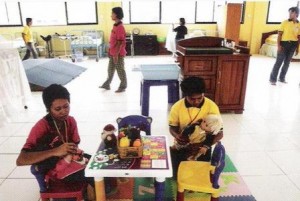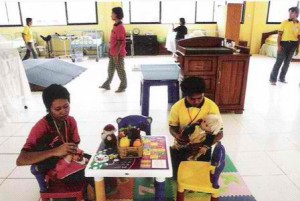By JOSEPH HOLANDES UBALDE

MAJORITY of the member-states of the International Labour Organization (ILO) overwhelmingly voted in favor of a convention that recognizes domestic work as work and paves the way for more protection and benefits for household helpers all over the world.
Voting 396–16 with 63 abstentions, the ILO adopted Convention 189: Decent Work for Domestic Workers on Thursday in Geneva, Switzerland.
Meanwhile, an accompanying Recommendation 201 was approved by a vote of 434 to 8, with 42 abstentions. Unlike the convention, which is a binding commitment by nations, the recommendation only serves as
guidelines for the state.
The ILO had already started discussing the inclusion of domestic work in the formal work sector as early as 1938 but only aggressively pushed for a convention in 2008.
“We are moving the standards system of the ILO into the informal economy for the first time, and this is a breakthrough of great significance,” said ILO Director-General Juan Somavia. “History is being made.”
At least two countries are required to ratify the Convention for it to come into force. The state will then have 12 months for the convention to take effect in its country. Uruguay and the Philippines expressed a strong commitment to the pact and vowed to ratify it.
The Convention for domestic workers aims to include servants, helpers, caregivers, and maids in the labor laws of the world. Prior to this, most nations, notably in Arab and Asian countries, do not have laws explicitly including maids in their labor laws. The convention extends further to those who are occasionally employed in household like laundry women and day laborers.
Under the Convention, domestic workers all over the world will have the same basic labor rights as those available to other workers; have reasonable work hours; earn a weekly rest of at least 24 consecutive hours; a limit on in-kind (food, shelter, education, clothing, etc.) payment; clear information on the terms and conditions of their employment; as well as the right to form unions.
A decade-old bill
Meanwhile, several labor advocacy groups have called on the Philippine legislators to speed up the passage of the Kasambahay Bill, a law that aims to increase the minimum wage of domestic workers and extend more rights and protection to them.
Ellene Sana, director of the Center for Migrant Advocacy (CMA), said lawmakers at the House of Representatives have been sitting on the legislation for some 10 years now.
“I don’t understand why it’s taking them this long,” Sana said.
According to Sana, once the Philippines ratifies the Convention and passes its own legislation for domestic workers, it can then leverage for similar protection and benefits for its nationals overseas.
“We will have the moral high ground to demand from the receiving country more rights for our workers,” Sana said.
Agnes Matienzo of the Migrant Forum in Asia echoed Sana’s concerns and stressed that passage of such legislation is an excellent complementary action to the Convention.
Matienzo said the ILO convention is “a good way to boost the campaign” for the Kasambahay Bill.
Senator Jinggoy Estrada, who heads the labor committee in the upper chamber, has earlier lambasted the House of Representatives for failing to act on the House version of the bill.
“The longer we delay this, the longer we are depriving them of decent working condition, benefits and labor rights,” Estrada said, quoted by newspapers last year.
Last year, the Senate approved on third and final reading the Senate version of the bill, which stipulates that employers need to pay their domestic helpers at least P2,500 if they are within Metro Manila; at least P2,000 if they are in first class municipalities; and at least P1,500 for those in third class municipalities.
According to Estrada, the Kasambahay Bill has been “languishing in the legislative mill” since 1996 when then Sen. Francisco Tatad filed a Senate Bill for household workers during the 10th Congress.
“It is high time to enact the long overdue Batas Kasambahay in order for the household helpers to have a decent living,” Estrada added.
In the Philippines, household workers receive only half of the minimum wage in the National Capital Region, while the rest of the country only pays them 45 percent of the minimum wage.
“Yet, they work much longer hours than other workers who are legally entitled to a minimum,” the ILO said.
According to the ILO in the Philippines, about half of domestic helpers work more than 10 hours a day.
The ILO estimates that there are between 53 – 100 million domestic workers in 117 countries. Around 83 per cent of these are women or girls and many are migrant workers.
